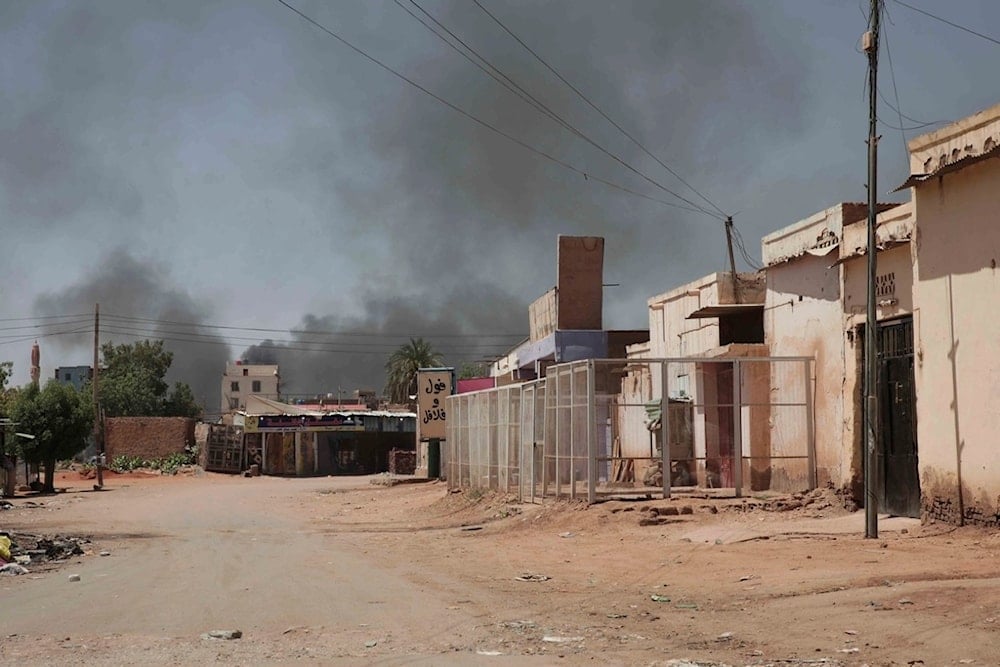Sudan's army retakes Khartoum North in fight against RSF
The army's capture of Kafouri, a wealthy district in Khartoum North, is particularly significant, as it had been a stronghold for RSF leadership.
-

Smoke rises in Khartoum, Sudan, Wednesday, May 3, 2023. Many people are fleeing the conflict in Sudan between the military and a rival paramilitary force. (AP Photo/Marwan Ali)
Sudan's military has retaken most of Khartoum North, intensifying its efforts to push back the Rapid Support Forces (RSF) and reclaim full control of the capital. The latest advances mark some of the army's most significant victories since the conflict erupted in April 2023, which has resulted in tens of thousands of deaths and displaced over 12 million people.
Speaking to AFP, military spokesman Nabil Abdullah confirmed that government forces, along with allied units, expelled the "remnants of the Daglo terrorist militias" from Kafouri and nearby areas, including Sharq El Nil, about 15 kilometers east of Khartoum.
Key Military Gains in the Capital
The army's capture of Kafouri, a wealthy district in Khartoum North, is particularly significant, as it had been a stronghold for RSF leadership, housing properties linked to Abdel Rahim Daglo, the deputy commander and brother of RSF leader Mohamed Hamdan Daglo.
With these territorial gains, the army has also begun moving toward central Khartoum, where clashes and explosions continue in the south of the city. Military analysts suggest that an RSF withdrawal from Khartoum would be a major turning point, as the paramilitary group has controlled large parts of the city since the war began.
Beyond Khartoum, Sudan's military recently recaptured Wad Madani, the capital of Gezira state, dealing a severe blow to the RSF and reinforcing the army's push to regain national control.
Footage of clashes between Sudanese regular army and Rapid Reaction Force near Khartoum.#Sudan pic.twitter.com/KpLnvYvQRJ
— Oo ps (@ps_trump) February 8, 2025
Burhan Announces Transitional Government
With the RSF losing ground, army chief Abdel Fattah al-Burhan announced plans to establish a transitional government, which he claims will help "accomplish the remaining military tasks" and "cleanse all of Sudan" of paramilitary forces. He also stated that the plan would set the stage for a broader political transition leading to elections.
However, this announcement has raised concerns about whether the military intends to share power with civilians or consolidate control over the government. The war has devastated Sudan, and while Burhan presents the move as a step toward stability, critics fear that it may further entrench military rule rather than restore civilian governance.
Among those witnessing the military's advance, Azahir Suleiman, a 43-year-old resident near Kafouri, described the joy of seeing RSF forces leave as "indescribable," telling AFP, "We are waiting for services to return, for our neighbours to come back and for this war to end so our country can be stable again."
Read more: Sudan plunged into darkness as drone strikes target key power stations
However, human rights groups have warned of potential reprisals in areas retaken by the military. Amnesty International has reported that lists of individuals accused of supporting the RSF—including activists, medical workers, and humanitarian personnel—are being circulated, raising fears of targeted violence.
In South Belt, RSF fighters reportedly detained two volunteers at Bashair Hospital, one of the few partially functioning medical facilities in the area. Meanwhile, the UN Human Rights Office has documented at least 18 civilian deaths in Bahri since the army's offensive in late January.
Additionally, after the military's takeover of Wad Madani, reports surfaced of mass executions of civilians suspected of RSF ties. While the RSF has been accused of committing ethnic-based violence, leading the United States to accuse it of genocide, reports have also emerged of civilians being targeted in army-controlled areas based on ethnicity.
Escalating Humanitarian Crisis
As fighting intensifies, humanitarian conditions continue to deteriorate. Médecins Sans Frontières (Doctors Without Borders) has reported an influx of wounded civilians, and international aid groups warn that the crisis could worsen if access to medical supplies and basic necessities remains restricted.
Sudan is experiencing one of the largest displacements in recent history, with over 12 million people forced from their homes. The ongoing violence, destruction of critical infrastructure, and limited humanitarian assistance have placed millions at risk of starvation and disease.

 4 Min Read
4 Min Read










